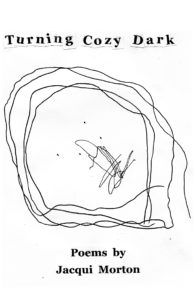 by Christine Orchanian Adler
by Christine Orchanian Adler
– Motherhood may be a universal experience, but it is a deeply personal journey for every woman. For some, it is seemingly effortless; for others, the challenges can be crushing. In her chapbook, Turning Cozy Dark, poet Jacqui Morton turns to the natural world to seek solace in the earth’s rhythms, hope in its continuous renewal and bridge the distance between her own ‘before’ and ‘after’ journey into motherhood.
Morton lets readers know they are in deep from the very first poem, “Unimaginable Loss”:
He came into the world like a psalm.
Slowly, like the foamy end of a wave
slides up the sand. Like the sleepy dawn
passing through on its way to tomorrow.
Though the title suggests the kind of loss no words can adequately convey, Morton’s use of imagery helps paint the picture and smooth the sharp edges of an otherwise unbearable parental experience: “His eyes must have held / most of her ocean. / She gave him her moon, // tops of mountains.”
It’s clear this is not just another chapbook on motherhood. Turning Cozy Dark explores topics seldom discussed: loss, infertility, longing. In “For Jennifer,” a nurse calls after 5pm on a Friday with the results of a test. The tears tell us it is bad news, but despite this, a would-be mother appreciates the caller for how she said what had to be said:
For Jennifer because
she said the baby is a girl
instead of the words
I hoped to hear later:
It’s a girl.
Morton is also deft at using humor and intriguing formats in her poems, which fluctuate from word definitions and to-do lists to diary entries and instruction manual pages—sometimes employing several at once. This style helps to convey a need for reason and control when faced with the frustration of struggling to conceive a child. We see this in “TTC”:
2. Dear diary,
There is a language to this
I’m not understanding.
It was in the faces
of my family
on Fourth of July,
when my baggy shirt
hid nothing but extra hot dogs.
It is in mother-in-laws
who calculate numbers
of grandchildren
accounting for two
not yet conceived. (by me)
Yet there are also moments of universality. In “Preservation Daydream Over Pie,” a mother sees the future generation in her toddler, which suddenly spurs an appreciation for her own mother:
I want moments with my mother in a box.
Racing the moon in her white Oldsmobile,
blowing bubbles after dinner in bare feet
out back, on our patio on Mountain Road,
water for pasta boiling Sunday soundtrack,
secret piano lessons, learning Edelweiss
for her birthday.
And what mother among us hasn’t wondered whether she is “doing it right” and questioned her own abilities? Recognition of our failings and the subsequent guilt it brings are two of the pillars of motherhood. Many readers will find themselves nodding in understanding at “Mother Makes Shapes Of Space”:
If I were a circle
drawn by the fourth grade me—
Ms. Rubin,
the teacher
who read stories
from a shiny
green-blue leather couch—
may have said
It’s a good circle
but not a perfect circle.
Turning Cozy Dark is a lovely encapsulation of all motherhood represents: humor, guilt, pain, joy and so much more. Morton’s fresh form, clear eyes and absence of pathos make Turning Cozy Dark a heartfelt and unique depiction of the journey, one worthy of many reads.
Turning Cozy Dark by Jacqui Morton
Finishing Line Press, 2013
23 pages
Paperback: $12
Christine Orchanian Adler’s poetry has appeared in Inkwell Journal; Coal: A Poetry Anthology; Penumbra; Tipton Poetry Journal, and elsewhere. Her articles, essays and book reviews have appeared throughout the Northeastern United States and Canada. She blogs at www.feedalltheanimals.blogspot.com, and lives in New York.
